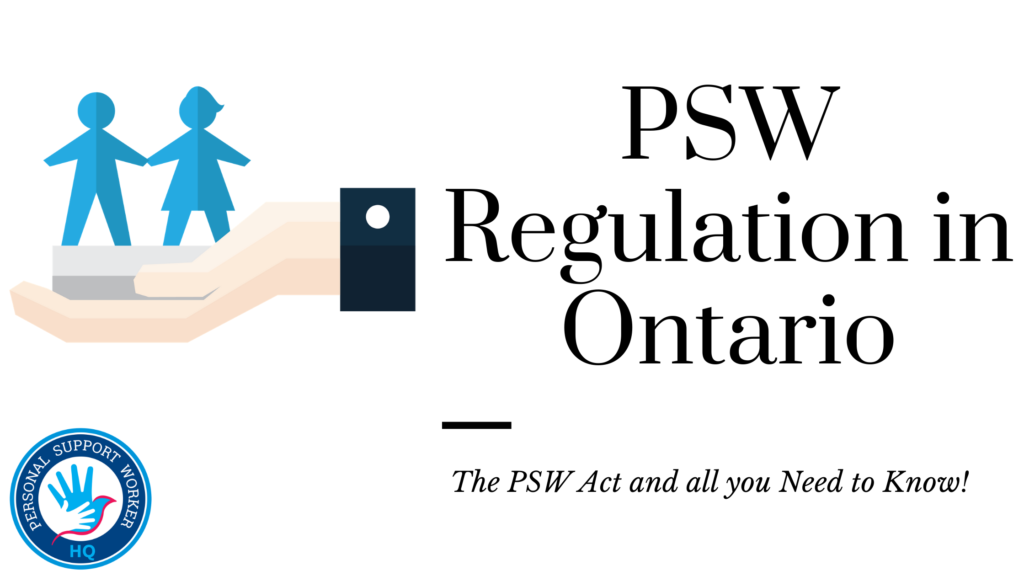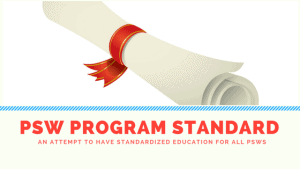Currently, Personal Support Workers (PSWs) in Canada have not regulated healthcare workers unlike other disciplines such as nursing and doctors.
Rather, PSWs perform non-skilled, role tasks that are vital to patients’ care and are supervised by regulated health care workers.
The Government of Ontario recently introduced a bill called the Health and Supportive Care Providers Oversight Authority Act, 2021.
This bill is meant for PSW Regulation, including personal support workers working in Ontario.
Please note that PSWs are not regulated health professionals yet.
The bill is only the beginning of the process and this post is for informational purposes only.
PSW Regulation
As you may already know, Personal Support Workers and related professions are not regulated in Ontario.
What that means is that there is no central governing body.
As an example, College of Nurses of Ontario (CNO) is the regulating body for all nurses in Ontario.
PSWs do not have such regulating body.
What is regulation?
In simplest terms, “regulation” means organizing activity according to a rule or law which is proposed and monitored by an authority figure or body.
In regards to healthcare, regulated clinicians such as nurses, doctors, and rehabilitation therapists have their own legislative practice acts that organize how they safely, legally, and ethically perform their healthcare-related duties and responsibilities.
Implications for the PSW Regulation?
The Government has put in a lot of effort and resources to train individuals willing to join this profession.
Many provincial and federal programs have been launched.
PSW programs are offered through public and private colleges and also through school boards.
There are many free options as well.
With an uptick in COVID-19 cases and the exponentially increasing aging population in Canada, the Government has been taking drastic steps to provide reliable staffing across the nation.
As a result, there is growing concern about the consistency in PSW training and placement as well as legal and ethical practices of each supportive care provider as they take on larger caseloads and job responsibilities.
This new regulated health professions act (the PSW Act) would provide regulations to protect PSWs and their patients from questionable practices and better define standards of practice across the PSW discipline.
Examples include better regulation of licensure, certification, and education.
What will it mean to be a regulated PSW?
As part of the practice Act, PSWs will be provided with visual markers or identifiers that signal to patients and other disciplines that he/she has to answer to a specific standard of practice set forth by regulated Advisory Committees and appropriate authority figures appointed by the Government.
This is common practice for nurses and therapists who have to carry proof of licensure and national certification regulated by larger entities such as the College of Nurses of Ontario or the Canadian Physiotherapy Association.
Who will be the authority for regulating the Personal Support Workers?
A corporation called the Health and Supportive Care Providers Oversight Authority will be considered the leading authority for regulating PSWs.
The corporation will be composed of members of its appointed board of directors.
The Act provides details about who qualifies to be appointed to the Authority, who and how a director Authority can be appointed, and rules regarding meetings, elections, and interim boards of directors if needed.
What is the process of applying for registration with the new authority?
A PSW who wishes to apply for registration or renew their registration as a licensed healthcare worker must do so according to the Authority’s criteria set forth by the Ontario’s Health System Act.
The CEO is the main communicator for PSWs seeking registration and will provide information about whether or not registration is granted or denied based on criteria met or missed.
What are the rules of registration?
Rules are set forth by the Authority’s by-laws as set forth by the Act.
In summary, PSWs who wish to register or renew need to do so by expiration dates or deadlines set forth by the authority and need to have met certain criteria (education, paperwork, etc.) also determined by the authority.
The Chief Executive Officer has the responsibility to provide the public with a registrar that logs all registered PSWs and any pertinent information about each registrant.
What are the procedures for complaints and investigations?
The Chief Executive Officer is charged with the duty to oversee complaints made against registered PSWs.
The Chief Executive officer is also responsible for appointing certified investigators for the purpose of gathering information about the PSW who is under investigation for a complaint.
The PSW Act also provides details about gathering evidence in legal manners such as entering facilities and homes under warrants, obtaining permissions to access documentation and patient information pertinent to investigations, etc.
The PSW who is being investigated for a complaint will be issued a notice where they are required to provide investigatory information in a timely fashion to the Authority.
Are there fees and additional requirements?
Specific fee amounts are not mentioned in the act.
The Authority is allowed to set up fees and additional costs in relation to registration in accordance with specified Act subsections.
This includes providing registrants with due dates, methods for fee delivery, clear penalties and additional charges for missed payments, collections process, etc.
In the miscellaneous section, there are requirements listed for the Authority and administrators of the Act to follow a certain level of confidentiality for registration information.
There are also rules provided for the times in which disclosure of registered PSW information is for the benefit of the public or related to a complaint or an investigation.
What are the offenses and related penalties for not following the rules of practice set forth by the new PSW Act?
PSW applicants and persons appointed in the Authority corporation can be subject to penalties if offenses are made.
Individuals who are found guilty of committing an offense or convicted can potentially be fined up to $25,000.
A corporation that is found guilty of committing an offense can be fined up to $50,000.
Section 55 in the Act provides further details about determining whether or not individuals or corporations have committed such offenses or broke the rules of practice.
The PSW Act is not in force yet
Please note that the new PSW Act is nor in force yet.
What you have read above is based on the first reading of the bill that was presented in the Ontario legislature.
Have any questions or comments, please utilize the comments section below.
Resources you’ll need to become a PSW
On this page, you can find anything there is to know about how to become a PSW, how to succeed as one, and how to continue your education. This is the place to come to and look for all the PSW resources and information that you may need on your journey as a PSW.
PSW job interview questions
If you’re determined to pass your next PSW interview with flying colors, we’re here to help. PSWHQ have put together a thorough online guide with PSW interview questions and appropriate sample answers to these questions that hit the target, and are concise and supportive.
Performing well in the interview is just one part of many others needed to secure a PSW Job. First and foremost, you’ll need to have an impeccable résumé and cover letter in order to be called for an interview.
Guide to finding PSW jobs
After you have decided to become a PSW and completed the course you are now at a point to start looking for work. It is important that you explore all the jobs listed under different job titles, which is why you should go through our ultimate guide to finding PSW jobs.
We also help you find PSW job postings from hospitals, long-term care homes, and community and private settings.
Advertising with PSWHQ
Over the past few years, PSWHQ has achieved a dominant ranking in major search engines such as Google and Bing. As a result, we offer a limited number of advertising opportunities to individuals, colleges, companies, and organizations we see as a good fit for the unique audience of PSWHQ.
FAQs
1. Is PSW a regulated profession?
Ontario does not regulate the profession of Personal Support Workers. Nursing is not governed by a governing body, such as the College of Nurses. The government sets the rules and regulations for PSW jobs in long-term care facilities.
2. Do you need a license to be a PSW in Ontario?
In Ontario, you do not need a license to be a PSW. However, there are many requirements that you must meet in order to work as a PSW. For example, you must have a minimum of six months of experience working with elderly or disabled individuals, and you must complete a training program that is accredited by the Ontario Ministry of Training, Colleges, and Universities.
3. What does regulation mean for PSWs?
Regulation for PSWs means that they are required to meet certain standards and qualifications in order to work in the field. This includes completing a training program and passing a certification exam. Regulated provinces also have set rates of pay for PSWs, which helps ensure that they are treated fairly and compensated appropriately for their work.
4. What PSW Cannot do?
PSWs cannot work independently and must be supervised by a registered nurse. The Nurse is responsible and accountable for all assessments of the patient safety, and documentation of all nursing care.
5. How do I get a PSW certificate in Ontario?
To get a PSW certificate in Ontario, you first need to complete an accredited PSW program. Once you have graduated from an accredited program, you can then apply for your PSW certificate.







